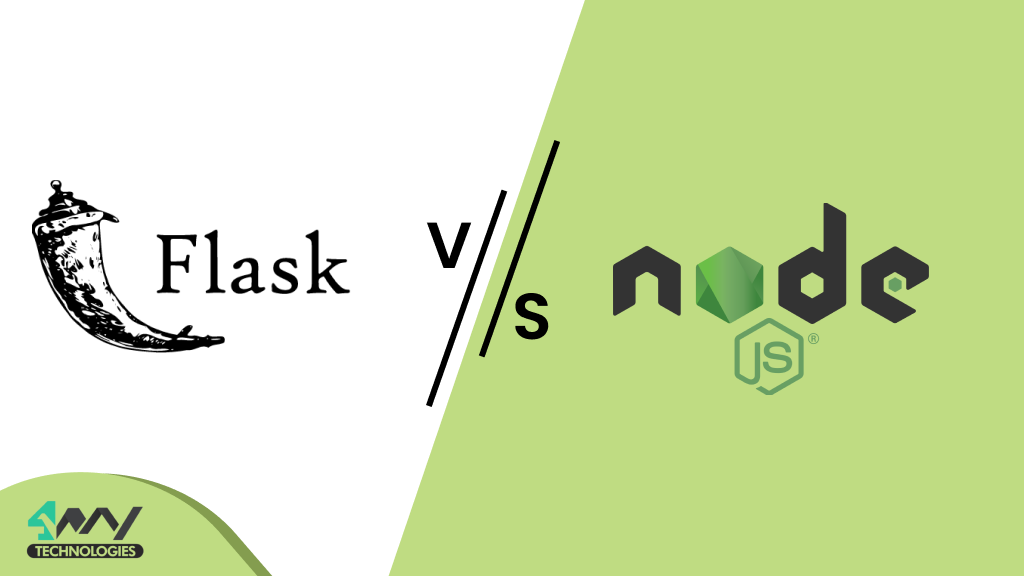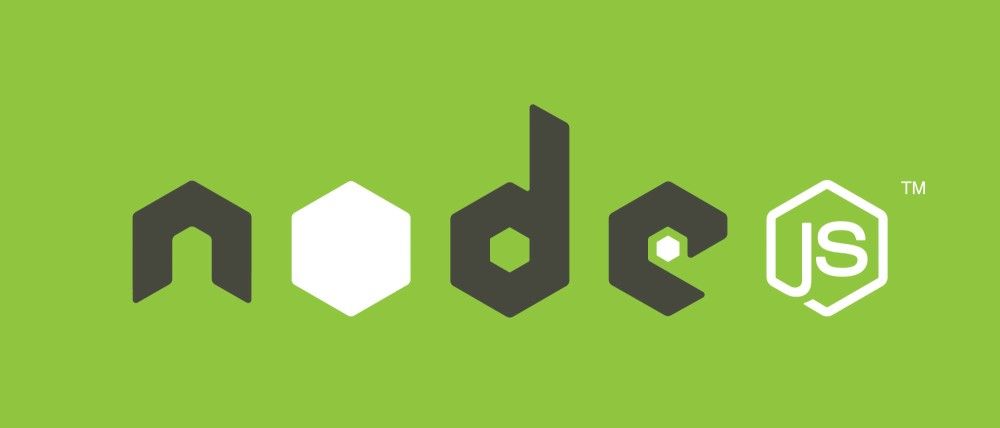Flask Vs Node.js – A Complete Comparison

While creating a project or developing an application, one thing that you should keep in mind before starting your project is the selection of the right and suitable programming language as per the needs and requirements of a project. As the development process of every application involves different specifications and requirements, therefore, you should always opt for the preferred and right technology in order to start the development process of your project.
Before proceeding further into the project building process, you should fix one of the primitive problems of choosing the right backend technology for the success and better results of your project.
In this article, we will be comparing the upsides and downsides of both the technologies: Node.js and Flask. After reading this blog, you will be able to understand the differences between them and efficiently choose the best technology that will suit well for the development process of your application.
Introduction
Starting with the fact that every full-stack development requires a combination of several technologies. We need to split the process of app development into frontend and backend. The web application’s frontend part is developed using technologies such as HTML, CSS, and JavaScript.
On the other hand, the backend part of a web app is developed in server-side-centric languages, which can suitably interact with the connected databases, network, or the underlying operating system when needed.
So, let us grab some knowledge about the two most popular technologies used mainly for backend development: Node.js, which is an open-source runtime environment for building server-side applications, and Flask, which is a great web app development frameworkof Python programming language.
Now, let us together compare these two top-notch application development technologies based on various parameters like architecture, community support, Syntax, speed, and more.
So, let us start!
What is Flask?

Image Source:flask.palletsprojects.com
Flask is one of the most popular web app development frameworks, which is a module of Python programming language used for the backend development of web applications. It is a microframework that comes with a small and easily extendable core and does not include an Object Relational Manager (ORM).
Flask was created by Armin Ronacher and written in the Python programming language. Working of the Flask web app development framework is based on the Jinja2 template engine and Werkzeg WSGI toolkit.
- WSGI
It is a short form of Web Server Gateway Interface, which is used as a standard gateway interface for developing web applications by using Python programming language. WSGI behaves like a common gateway interface between web apps and web servers.
- Werkzeug
It refers to a WSGI toolkit, which is responsible for implementing requests, utility functions, and response objects. Werkzeg is one of the bases of the Flask web app development framework.
- Jinja2
It is a famous template engine used for the programming language Python. A web template system is responsible for combining a specific source of data with a template for rendering a dynamic web page.
What is Node.js?

Image Source: brainvire.com
Node.js refers to a server-side platform designed on the JavaScript Engine (V8 Engine) of Google Chrome. It was created by Ryan Dahl in the year 2009 and currently, the developers are using v0.10.36, which is the latest version of Node.js.
It is a Cross-Platform and open-source runtime environment used for developing scalable and fast networking and server-side applications.
Node.js is also responsible for using the non-blocking and event-driven I/O model. Therefore, Node.js is a quite efficient, lightweight, and ideal platform for running data-intensive real-time apps across various devices.
Written in JavaScript, Node.js apps can run within Node.js runtime on distributed operating systems such as OS X, Linux, and Microsoft Windows. Node.js also includes a rich and enhanced library with a number of JavaScript modules in order to make the app development process quite easier and quicker.
[ Node.js = Runtime Environment + JavaScript Library]
Why the Decision of Choosing the Right Technology Matters?
When it comes to choosing the right technology for your project, asking your friend for recommendations, browsing on the internet, or going with the preference of professional programmers might not give you an accurate answer. As a result, you will be left only with a number of opinions.
Therefore, in order to select the best technology for the creation of your application, you must consider every programming language and technical framework that can efficiently meet the requirements and target of your project, which is the primitive criteria for building a scalable, robust, and powerful application.
The best practice does not include choosing the most popular technology. But, it would be worthwhile to analyze the technical stack performance along with your requirements and capabilities. For example:
- Budget of the product
- Geography
- Product type
- Features and functionalities of your project
These are some of the preferred parameters that you must consider along with many others as well that we have not covered in this article for the better development of your application.
Now, by comparing the two popular backend development technologies: Node.js, and Flask, you will be able to understand the technical differences by their different application areas and advantages.
Also Read:-https://4waytechnologies.com/blog/how-to-develop-a-live-streaming-app/
Comparison Between Node.js and Flask

Before we proceed, we must be aware of the fact that Node.js is not a programming language as it is a runtime environment that developers like you, use to create robust and scalable network applications. On the other hand, Flask is one of the most popular web app development frameworks of the Python programming language.
Now that we have understood enough about Node.js and Flask, let us together compare these two impeccable technologies on the basis of different parameters for more clarity.
1. Performance and Speed: Node.js vs Flask
Node.js
As the JavaScript code in Node.js is responsible for interpreting with the V8 engine, the performance of Node.js is flawless. Also, the code applied by Node.js is outside of the web browser. Therefore, the performance of the application becomes more enhanced and the app gets efficient resources. Moreover, Node.js also enables single module caching, which is responsible for eliminating the loading time of the applications making them more responsive.
Flask
Both Flask and JavaScript are generally slower as compared to other compiled languages such as Java. Flask is a single-flow web app development framework and unlike Node.js processes requests more slowly.
Therefore, Node.js is a much better option than Flask for building high-performance-driven and speedy applications.
In this way, Node.js is a clear winner when we talk about the performance and speed of an app.
Node.js = 1, Flask = 0.
2. Architecture: Node.js vs Flask
Node.js
Node.js possesses an event-driven non-blocking architecture, which is responsible for allowing multiple requests simultaneously. Node.js also plays an important role in enabling asynchronous output or input. Additionally, while developing applications with Node.js, every time an event happens, a specific procedure is called, which helps in avoiding the procedures hindering the thread.
Flask
The designing process of Flask is quite different in comparison with Node.js. Flask uses special tools to develop asynchronous and event-driven applications. Moreover, the non-blocking I/O of Flask requires the use of web servers such as Gunicorn, which is a non-blocking web server.
Therefore, Node.js is again the winner because of a faultless event-driven architecture.
Node.js = 2, Flask = 0.
3. Scalability: Node.js vs Flask
Node.js
Scalability is the ability of an application to assist a maximum number of users without any error in the performance of the app. Node.js possesses high scalability as it creates asynchronous architecture in one single thread. It is a default feature of Node.js that ensures seamless and high scalability of an app written with the help of Node.js code.
Flask
Flask is a framework of Python, so it uses Global Interpreter Lock (GIL) and does not support multithreading. However, if you want an application with higher scalability, the need of enabling multithreading is a must. Also, dynamically-typed languages can make systems more difficult to maintain and complex.
Since apps created using Node.js provide seamless scalability in comparison with Flask, Node.js is again the winner in this case as well.
Node.js = 3, Flask = 0.
4. Extensibility: Node.js vs Flask
Node.js
Developers can easily extend, integrate, and customize Node.js with the help of various tools. It can also be extended using the built-in APIs for creating HTTP or DNS servers. For example, Jasmine is a great tool for unit-testing and Log.io is very useful for monitoring the projects and fixing errors. Hence Node.js is highly extensible.
Flask
Flask, on the other hand, also provides flexibility to the developers in order to customize their apps as per their requirements. In this way, developers like you can reduce issues that could persist because of the other frameworks’ rigidity. Therefore, Flask is also a highly extensible web app development framework.
As, both the technologies are highly extensible, So, both Node.js and Flask will get one point in this case.
Node.js = 4, Flask = 1
5. Learning Curve: Node.js vs Flask
Node.js
Learning curve refers to the measurement of the capacity of users to write code in a language or specific framework. The learning curve is responsible for explaining the fluency of web app developers in syntax and tools. So, if you are well aware of JavaScript, learning the Node.js framework would not be a tough task for you.
Flask
On the other hand, Flask possesses a simple syntax and a cleaner and compact code. Therefore, it becomes quite easy for you to write the code with fewer lines. Also, Flask has great documentation and you would not run short of resources or knowledge whether you are a professional programmer or on a beginner level. In this way, Flask is a bit easier to learn as compared to Node.js.
Since we found that Flask possesses a great learning curve and developers find it easier to learn as compared to Node.js, Flask is the clear winner in this case.
Node.js = 4, Flask = 2.
Well! That would be all in the comparison between Node.js and Flask. Although Node.js is a clear winner according to our point system, Flask is also a popular web app development framework of Python with its own advantages.
Also Read:-
https://4waytechnologies.com/blog/how-to-design-and-develop-samsung-smart-tv-app/
Conclusion
We hope that you will find this article helpful. Well! It is not that easy to decide which one is better than another as both have some upsides and disadvantages. Thus, the choice of the best technology depends on the specifications, requirements, features, and functionalities of your project.

4 Way Technologies is a premium IT services company that develops web, mobile, and SMART TV applications using cutting-edge technologies like React, Node.JS, Deno, Go lang, AWS, and AEM. We establish our thought leadership by sharing content and insights around technology.